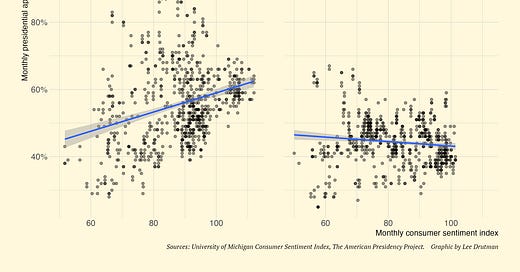What if It’s Not the Economy (Stupid)?
Why 2024 is shaping up to be a very strange presidential election.
The 2024 presidential election sure is shaping up to be a weird one.
Only once before did a party re-nominate a former president who had lost the previous election. That election, of course, was 1892, when Democrat Grover Cleveland, who had lost the Electoral College narrowly in 1888 (despite winning the popular vote), ran again. Cleveland won, as we all remember, by flipping the key swing states of New York and Illinois. Thus did Cleveland become the 22nd AND the 24th president.
So, assuming 2024 is Biden-Trump, we only have one comparable election, and it’s from before sliced bread was invented. This is what makes forecasting and analyzing presidential elections so hard. There are so few of them, and each one is different. A country can change a lot over four years.
And candidates themselves matter a lot. Or do they?
In presidential election handicapping, two rules of thumb have generally guided analysis: 1) It’s the Economy, Stupid; and 2) Incumbency is an advantage.
I’m here to question both those rules of thumb. I don’t think they apply under current conditions.
It’s a strange presidential election because it’s a strange time in our politics. Uncharted territory, really.
It’s not the economy, stupid
Much commentary about Biden’s struggling poll numbers focuses on the economy.
One line of commentary is: If only people realized how good the economy actually is (instead of getting just Fox News economy-is-falling propaganda), Biden would do better.
Another line of commentary is: Inflation is slowing, and as the economy continues to improve, perceptions of the economy will catch up, and Biden will benefit.
Maybe. But I’m a data guy. And if I look at the data, it looks to me like presidential approval is unrelated to the state of the economy these days. It’s been this way for two decades.
Or if you prefer an illustrative recent headline: "Americans More Upbeat on the Economy; Biden’s Job Rating Remains Very Low”
This de-linking also showed up in a 2016 article by John Sides, Lynn Vavreck, and Michael Tesler, “The Electoral Landscape of 2016,” which noticed Obama’s approval rating was resistant to improving economic condition. They blamed the resistance on partisanship — particularly Republicans failing to change their minds about Obama.
Of course, it’s possible that the connections between the economy and presidential support were never as strong as the “It’s The Economy, Stupid” conventional wisdom suggested. As one recent study suggested, “when studying the numerous empirical studies for the United States in detail, the reported evidence on economic determinants is surprisingly inconsistent and fragmentary.”1
So what’s happening here?
The 40-20-40 Electorate
As a rough schematic, consider the American electorate as a 40-20-40 electorate. Forty percent always Republican, Forty percent always Democrat, and 20 percent Shrug Emoji
Let’s start with the 80 percent solid partisans. It’s a big category and contains multitudes. But the multitudes within the 80 percent do agree on one big thing: the opposition party is terrible for the country, and therefore they can do no good in power. They just agree about which party is the opposition.
In the Republican circles, little good news about Biden’s performance seeps through. To the extent any good news gets through, there is only one explanation: it must be happening despite Biden and the Democrats, or because of something Trump did, or some Republicans elsewhere did. Most political energy, both online and offline, focuses on constructing and then reaffirming outrage at Biden and the Democrats.
Democrats are not the mirror image (for one, they are more self-critical). But were a Republican to be back in the White House, the Democratic-oriented media and conversations would turn criticism back to Republicans. Still, for the time being, most Democrats will (reluctantly) support and approve of Biden no matter what because the alternative is so unthinkable.
Both partisan camps have become more entrenched and more isolated from each other over the last several decades, hardening their defenses as politics has turned into something more like war.
Hyper-partisanship has changed how people evaluate the president. In the past, Democratic voters might sometimes rally around a Republican president (e.g., the first Iraq war, or 9/11), and Republican voters might sometimes support a Democratic president (see LBJ’s 1964 landslide, for example). Partisanship was real, but not all-abiding.
Today, for many voters, partisanship is indeed all-abiding. There is simply nothing Joe Biden could ever do to win support from at least 40 percent of the country. And at this point, probably more.
Here, I’ll pull out a 2019 study, “Bad characters or just more polarization? The rise of extremely negative feelings for presidential candidates” (By Dino P. Christenson and Herbert F. Weisberg). Looking over six decades, they find that voters today evaluate presidential candidates almost entirely in partisan terms, and view the opposing party’s candidates extremely negatively. In the past, voters considered individual presidential traits, and viewed presidents as individuals.
Below is a graphic from their paper, which helps tell this story pretty clearly. It’s a little complicated though, so let me explain it.
The “Candidate Thermometers” on the left show a density plot. If we start from the bottom, we can see that in 1968, most people had favorable views about both presidential candidates (above 50 on the feeling thermometer).
But the light gray responses, which represent opposition voters (Democrats feelings’ about the Republican and Republicans’ feelings about the Democrats) drift left, to the 0 point, as time goes on.
The averages are represented in the time series on the right. Voters start to really dislike the other party’s candidate in this recent era. This data goes up to 2016. But if it went to 2020, the trends would continue.
In earlier decades, partisan loyalties were blurrier and softer, and more Americans felt positive enough about both parties, and American politics more broadly, to keep an open mind.
First, media options were more limited. In an era of thriving local papers, even if you just wanted to read sports, you still encountered the newsy front page first. Now you can just click right to a sports website. Second, more people inhabited social networks of mixed partisanship. People who opposed the president connected with others who supported the president. Interpretations of reality might differ, but underlying realities were at least overlapping.
Now we live in a world of more specialized news, and less cross-partisan interaction. The result is three distinct realities: The Republican Reality (40 percent), the Democratic Reality (40 percent), and the pivotal “Politics is messed up so I just tune it out, except for the bad news” Reality (roughly 20 percent of the electorate, but probably half of the country, given the many nonvoters who are completely checked out).
The electorate is 20 percent Shrug Emoji
So about that remaining 20 percent or so of the electorate? These are our Shrug Emoji voters. Disaffected from both parties, and mostly disengaged. They skew less wealthy, and younger, than the rest of the electorate. They defy easy ideological categorization. They vote sometimes, if they can be convinced the stakes are high enough to pay attention, or a new candidate breaks through and energizes them. The most pivotal are the least knowledgeable, an odd group for a democracy to empower.
They begin with a broad cynicism towards anyone in power. If anything unites them, it is a broad anti-system animus. Establishment politicians hold an especial stink for these voters. And because they mostly tune out political news (which the current media environment makes easier than ever), little news breaks through to them.
The news that does break through to the Shrug Emoji voters, however, is mostly bad news. Bad news is more interesting and engaging. Bad news is more memorable. In the running tally we keep in our brains, grievances accumulate steadily. Apply our innate negativity bias to those who are already most negative about politics to begin with, and you have a powerful super-negativity, running on the negative charges that percolate in the news, especially from the opposition.
In the past, these pivotal voters were more open to both parties. But decades of negative campaigning have taught them that Washington is corrupt, and nobody should be trusted, especially not Democrats or Republicans. And changes in media structure have made it easier for these voters to ignore most political news altogether. (You no longer need to first see the front page to get the sports section). Now they dislike both parties, though most still think one of the two major parties is clearly worse (all that negativity accumulates)
Incumbency is also a victim of 40-20-40 politics
This 40-20-40 political environment is bad for incumbency. Americans really don’t like their national leaders right now. No national political figure is nationally popular. This is part of Biden’s problem. It’s not just about his age, or the economy, or his foreign policy, or whatever the explanation du jour. It’s the fact that he’s a familiar national politician.
Thus, as I argued in a recent piece in Time: “Incumbency is No Longer an Advantage in Presidential Elections”
Up through 2012, incumbency had a solid track record. Between 1936 and 2012, 11 out of 14 presidents seeking a second White House term were re-elected. This led to some theorizing in search of an explanation. As I explained in my Time piece:
“The long-standing reasons political scientists gave for a presidential incumbency advantage included: 1) political inertia and status quo bias (most people will support an incumbent they voted for the last time); 2) experience campaigning; 3) the power to influence events (such as well-timed economic stimulus); 4) the stature of being a proven leader; 5) the ability to command media attention in a “constant campaign” environment; and 6) a united party with no bruising primary challenges.”
I ask today: How many of these reasons still make sense as reasons to think incumbents have an advantage?”
The “Cost of Ruling” is real and universal
Since I wrote the Time piece, I’ve read a bit into the scholarship comparative incumbency. I learned that incumbents’ decline in support is so universal that political scientists have codified this consistent support decay as a “Cost of Ruling.”
The basic pattern is pretty straightforward: A fresh-faced challenger defeats a less popular incumbent, forms a new government, and starts with an initial approval bonus (humans have a natural attraction to novelty, with all its blank slate possibilities.)
Then time passes. Some bad news is inevitable. Nobody gets everything right. And things just go wrong in the world. Bad news accumulates, tipping support downward. Whether the economy goes up or down matters less than the simple passage of time, and the accumulated grievances that time brings. Scholars describe this as a "Grievance Asymmetry" - bad news carries more weight than good news. And even if the two balance each other out, we will remember more of the bad news than the good news. So the good really has to overwhelm the bad.2
Across democracies, the average term in government costs an incumbent about 2 1/2 percentage points in support. The “Cost of Ruling” dynamic has been remarkably consistent across time.
Obviously, some leaders manage to stay popular for many years, and obviously certain political environments are more punishing than others. This “cost” is an average, not an absolute.
So, all incumbents suffer some support decay. But in contemporary American politics, national incumbents start out with very little of it to begin with. And once it’s lost, it’s very hard to build back.
Are we in a “Collapse” era?
If you look at presidential approval ratings over time, you see that for the past two decades, we’ve been in an era of persistently low presidential approval.
Michael Podhorzer had a nice piece in his Weekend Reading substack last year (titled “Don't Panic About Biden's Approval Ratings”). I’m particularly struck by this graph illustrating three different eras of approval, which he calls “Pre-Voting Rights”, “Interregnum” and “Collapse.”
As Podhorzer notes: "These stepwise drops reflect voters’ growing alienation from, and lack of confidence in, our national governing institutions much more than they are assessments of individual presidents’ performance.”
This growing alienation is a key part of the story. And it keeps getting worse.
How 2024 could play out
Assuming we are in a Biden-Trump general election campaign, the strategic playbook this reality suggests is depressingly familiar. Go negative, because the negativity bias is real, and positive campaigning won’t resonate in this environment, no matter how much we say we want it.
People already know what they think of two well-known and largely disliked candidates. No economic news will change that. The candidate who convinces the pivotal 20 percent that the other guy is far worse will win the election.
Of course, this is really bad for democracy, since more negative campaigning will only make Americans dislike each other more, and become more cynical about politics.
Biden might well win in this lesser-of-two-evils election. Trump is also very unpopular! But it will be nasty. And it will make our democracy even more degraded in the process.
I’d love to see Democrats put a fresh face at the top of the ticket — not just because it’s clear to me that Democrats would benefit electorally from a fresh face. But also because it could make the campaign a little less negative, a little more about the future, and engage a new generation of voters (in a similar way that Obama did in 2008).
I know any alternative to Biden will get the same incoming attacks. But it takes a while for those attacks to really sink in. Biden is dealing with the accumulated attacks and familiarity of 12 years in the White House, and the last four have been absolutely brutal.
Obviously, it would take an extraordinary change of events for the Democrats to choose a nominee other than Biden in their August convention. But this is the favorite parlor game among panicked Democrats, so I’m adding my pair of pennies to the debate. Looking at the landscape of possible nominees, Gretchen Whitmer would be especially strong at the top of the ticket. Here, I’m struck by this recent polling tidbit: In Michigan, Trump leads Biden 47 to 39. Among those same voters, Whitmer beats Trump 49 to 45. Now, I take any poll at this point with a grain of salt and all the usual caveats. And obviously, some of those Michigan Whitmer supporters will come around to Biden. But that’s a very big swing.
The longer-term problem: we can’t keep doing this.
But whatever happens in 2024, something needs to change.
We can’t keep doing this. We need more choices. We need more flexibility and fluidity in our politics. Every election can’t be a repeat of the same old grudge match.
We need more political parties.
In Congress, this would mean multiparty proportional representation, giving voters more options for smaller adjustments across the political spectrum, and more identities outside of just two. In Presidential elections (and other inherently single-winner elections), this would mean fusion voting, such that multiple parties could coalesce around and endorse a single presidential candidate, while giving voters the power of expressing their collective values through distinct ballot lines.
A politics where deep disaffection and polarization have undermined the link between economic performance and presidential approval is a dangerous politics. It’s dangerous because it de-links elections from governing performance and turns elections instead into a mere headcounts.
It’s not clear we can stand another zero-sum scorched-earth election between two widely disliked and way-too-familiar adversaries.
I began this essay with the election of 1892. That year, a third party presidential candidate, the populist James B. Weaver, won 8.5 percent of the popular vote, and carried five western states (gaining 22 Electoral College Votes). The backlash to the Gilded Age and its crushing inequalities had begun as a revolt against the two-party system. In the 1890s, good governance reforms were gaining hold, a reform movement that would quickly turn into the Progressive Era.
So, are we on the verge of a new reform era?
I certainly hope so. And if so, I also hope we learn the lessons of the Progressive Era, and focus on reforms that strengthen political parties, and not weaken them. But that was the topic of a previous Undercurrent Event: “A healthy democracy requires healthy political parties.”
Berlemann, Michael, and Sören Enkelmann. “The Economic Determinants of U.S. Presidential Approval: A Survey.” European Journal of Political Economy 36 (December 1, 2014): 41–54. https://doi.org/10.1016/j.ejpoleco.2014.06.005. p. 42
Cuzán, Alfred G. “The First Two Laws of Politics: Nannestad and Paldam’s ‘Cost of Ruling’ Revisited.” Acta Politica 57, no. 2 (April 2022): 420–30. https://doi.org/10.1057/s41269-021-00199-3.
Nannestad, Peter, and Martin Paldam. “The Cost of Ruling: A Foundation Stone for Two Theories.” In Economic Voting, 17–44. Routledge, 2003.
Thesen, Gunnar, Peter B. Mortensen, and Christoffer Green-Pedersen. “Cost of Ruling as a Game of Tones: The Accumulation of Bad News and Incumbents’ Vote Loss.” European Journal of Political Research 59, no. 3 (2020): 555–77. https://doi.org/10.1111/1475-6765.12367.












I get the theory behind the Democrats putting forth as a presidential candidate in 2024 someone besides Joe Biden. But then I look at the practicalities of that actually happening. It's simply too late for a serious candidate to challenge Biden in the primaries. And if he withdrew from running for reelection today, that would still create a messy contest because a goodly number of the deadlines to get on state primary ballots have already passed, so we could see the biggest convention fight in modern times.
It's anyone's guess as to how that would turn out. I've seen some pundits express worries that it could be so bruising that the winner would walk into the general election wounded, a la George McGovern in 1972. But even if folks were on their good behavior and the party quickly coalesced around a consensus candidate like Whitmer, she would likely be at a disadvantage to the Republican nominee in terms of name recognition, campaign organization and fundraising.
Would Whitmer's relative lack of baggage compensate for all of that? Or would the right-wing noise machine take advantage of her not being a known quantity nationally?
The time to be having this discussion was a year ago, when it was still possible for a serious candidate to challenge Biden. He has shown no sign of dropping out, so in the absence of him experiencing a health issue, Biden is going to be the Democratic nominee. Meanwhile, despite Nikki Haley's moment in the sun, her chances of winning the Republican nomination are quite small in the absence of Trump dying or his legal troubles suddenly becoming much more of a negative to Republican voters than they have been so far.
I would agree that we can't keep doing this, but it's hard to see how major reforms would be possible without the Democrats winning the presidency and both houses of Congress in 2024. How can that happen given the teams already on the field?
Is fusion voting preferable to approval or score voting? I think the latter two might have the same or more effect of reducing polarization (moderate candidates for president would be more likely to win, especially in current conditions, and this includes third party candidates, opening the door for third parties, and when someone you "approved" of or gave a medium score wins, you'll be less likely to resent them). Or should we do both at the same time?
Under fusion voting, who determines which candidates are a part of which parties, the party machines? I imagine every candidate would want their name listed as many times as possible, and that would create ridiculously large lists of candidates, and that seems a bit silly. Unless it was one line per candidate, with that line listing all of that candidate's parties, but that's different than what the infographic showed.